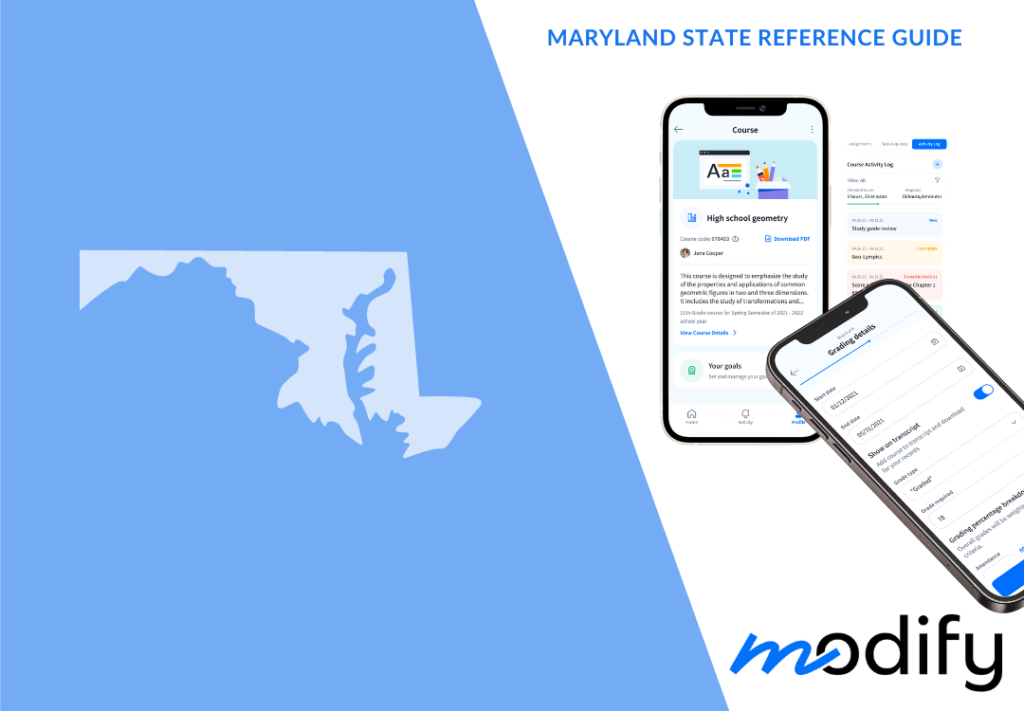Maryland Homeschool Laws
Homeschooling in Maryland
How do I start homeschooling?
While there are three options to legally homeschool in Maryland, these steps must be followed regardless of the option you choose.
Choose an option to homeschool under [portfolio, church umbrella, state approved umbrella]
File a Notice of Consent form with your superintendent.
Teach the required subjects: math, English, social studies, science, art, music, health, and physical education.
Provide the required instruction, that must be “of sufficient duration”.
Choose your homeschool curriculum (curriculum choice is up to the parent).
Maintain a portfolio.
Respond to your superintendent’s requests to review your portfolio, or hold periodical conferences with your umbrella school.
Modify™ can help you with your tracking, portfolio and record keeping. Download the app today.
Enjoying learning together!
Homeschool Laws
According to the Maryland’s Education Article §7-301, “each child who resides in Maryland and is 5 years old or older and under 18 shall attend a public school regularly during the entire school year unless the child is otherwise receiving regular, thorough schooling during the school year in the studies usually taught in the public school to children of the same age.”
As an alternative, “Maryland recognizes nonpublic schools and home schooling as options to public school enrollment for students to receive regular, thorough instruction. […] A parent or guardian who chooses to provide a home instruction program for his or her child must submit to portfolio reviews by the local school system or be supervised by one of the following [registered nonpublic] entities: 1) a nonpublic school that holds a Certificate of Approval from the Maryland State Department of Education; 2) a church-exempt nonpublic school; or 3) an institution (education ministry) offering an educational program operated by a bona fide church organization.”
A document titled, Compulsory Attendance Law as Applied to Home Instruction Students, clarifies supervision as it relates to compulsory attendance: “Until the child reaches the age of 18, his or her home instruction program must be reviewed by a supervising entity, which may be a local school system or a nonpublic school or institution, consistent with COMAR 13A.10.01-.05. Once the child turns 18 years old, there is no longer a legal requirement for his or her home instruction program to be reviewed. Of course, the law does not preclude a supervising entity from reviewing the work of a child who is 18 years or older, if the child wants to finish the home instruction program and the supervising entity agrees.”
A child under the age of 18 who has completed coursework may be exempt from the compulsory attendance law, as long as certain criteria are met. “If a child is over the age of 16, and is either participating in a home instruction program or has completed one […], he or she may register for the GED test. If the child has not completed his or her home instruction program, however, and does not achieve passing scores in all subject matters on the GED test, the child must continue to participate in a home instruction program or enroll in school until he or she reaches the age of 18.”
The requirements for a home instruction program are described in the Code of Maryland Regulations, COMAR 13A.10.01.01.
Homeschool Requirements
Even though Maryland does not highly regulate homeschooling, there are some Maryland homeschool requirements you must satisfy when you homeschool:
- Begin homeschooling by age 5.
- File the required statement of intent to homeschool according to the requirements.
- Provide annual verification of the continuation of homeschooling with the local school system or nonpublic school or institution supervising the homeschool program (and notify that entity of any change in status within the school year).
- Teach the Maryland homeschool required subjects: “English, mathematics, science, social studies, art, music, health, and physical education” (Maryland Department of Education). You are responsible for choosing a curriculum and instructional materials, but your homeschool program does not need to be aligned with Maryland’s College- and Career-Ready Standards.
- Stay current with homeschooling laws and requirements.
Record Keeping
Families homeschooling in Maryland must keep their own records if they plan on homeschooling under the portfolio option. Your child’s records must include information such as attendance, samples of student work, grades, and any other pertinent information.
Those who choose to homeschool under the other two choices can take advantage of the added convenience of having the church or school umbrella maintain and/or issue records and progress reports
Graduation requirements
Since homeschoolers in Maryland cannot receive a state-issued high school diploma, there are no specific graduation requirements for students to meet. It is up to families to decide everything from courses to credits, as well as any volunteer hours or standardized tests to take, if any.
If your student is planning on attending college, a high school transcript will be of utmost importance. Knowing the college or university’s entrance requirements can help point you in the right direction when it comes to what coursework to complete during the high school years.
Modify™ helps homeschoolers to keep all necessary records and transcripts.

REFERENCE GUIDE:
Maryland’s Education Article §7-301
Compulsory Attendance Law as Applied to Home Instruction Students
COMAR 13A.10.01.01.
Maryland’s College- and Career-Ready Standards.
Note: All information on this site is provided with no guarantee of accuracy. Modify™ is not responsible for any errors, omissions, or outdated information, or for the results yielded through use of this information.





